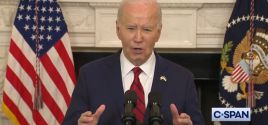AG Nominee Loretta Lynch's Worrisome Answer on Civil Asset ForfeitureBy Adam BatesCato @ Liberty Feb. 03, 2015 |
Popular 
Claim Jewish Student Was 'Stabbed In The Eye' by Pro-Palestine Protester Draws Mockery After Video Released

Senate Passes $95B Giveaway to Israel, Ukraine, and Taiwan, Combined With TikTok Ban

Biden Signs Bill to Give $95B to Israel, Ukraine and Taiwan, Ban TikTok

Mistrial Declared in Case of Arizona Rancher Accused of Killing Migrant Trespasser

Sen. Hawley: Send National Guard to Crush Pro-Palestine Protests Like 'Eisenhower Sent the 101st to Little Rock'
 Referring to the federal government's forfeiture regime as "an important tool" in fighting crime, attorney general nominee Loretta Lynch staunchly defended the concept of civil asset forfeiture during the first day of her confirmation hearings. After Sen. Mike Lee (R-UT) questioned the "fundamental fairness" of Americans having their property taken by the government without any proof (or often even suspicion) of criminal wrongdoing, Lynch asserted that there are "safeguards at every step of the process" to protect innocent people, "certainly implemented by [her] office "¦ as well as an opportunity to be heard." Even setting aside the litany of federal civil asset forfeiture abuses that have come to light recently across the country, Lynch's reference to her own office's handling of civil forfeiture is particularly concerning. Lynch is currently the U.S. attorney for the Eastern District of New York, and her office, despite its safeguards, is responsible for one of the more publicized and questionable uses of the asset forfeiture program. In May of 2012 the Hirsch brothers, joint owners of Bi-County Distributors in Long Island, had their entire bank account drained by the Internal Revenue Service working in conjunction with Lynch's office. Many of Bi-County's customers paid in cash, and when the brothers made several deposits under $10,000, federal agents accused them of "structuring" their deposits in order to avoid the reporting requirements of the Bank Secrecy Act. Without so much as a criminal charge, the federal government emptied the account, totaling $446,651.11. For more than two years, and in defiance of the 60-day deadline for the initiation of proceedings included in the Civil Asset Forfeiture Reform Act of 2000, Lynch's office simply sat on the money while the Hirsch brothers survived off the goodwill their business had engendered with its vendors over the decades. That case, which was handled by the Institute for Justice, finally ended just days ago when Lynch's office quietly returned the money, having found no evidence of any wrongdoing. The Hirsch brothers and their business survived, but just how many law-abiding small businesses can afford to give the government a 33-month, interest-free loan of nearly half a million dollars? Civil asset forfeiture is rife with government abuse. The tales of lost livelihoods and predatory government agencies are legion. The data support the indignation. A bipartisan coalition of congressmen and even the current attorney general himself have acknowledged the need for reform. Unfortunately, Lynch's comments and her history as a champion of civil forfeiture inspire little hope that major and much-needed reform is imminent at the Department of Justice. |



